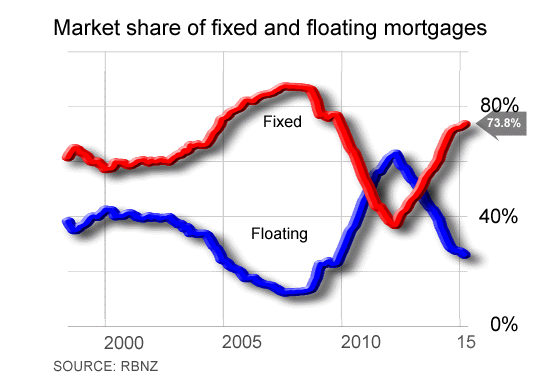
Another Reserve Bank Official Cash Rate review is coming this Thursday and various observers are preceding that with fix-or-float opinions.
It is the wrong question.
Almost everyone who should seems to have fixed already.
And those that haven't are probably doing so for a good reason.

As the chart shows, only 26.2% of all mortgages are now on a floating interest rate. Apart from the 2005 to 2008 period when we had inverted rates, this is an historically low level. It will undoubtedly fall further in coming months but it is unlikely to fall much below 20%.
And there are sensible reasons why some borrowers will still choose variable interest rate terms even when those rates are above fixed rates.
Firstly, many, many borrowers split their total mortgage requirements between fixed and floating elements. The floating elements allow borrowers to make lump-sum paydowns to their total borrowing without incurring any break penalties.
Secondly, there are borrowers who are near the end of their loan repayment terms. The $ interest load is actually very low in these cases and there seems very little point in fixing and not having the option to pay off early if circumstances allow.
But more importantly, there will always be a core of smart borrowers who choose to use revolving credit facilities, which are all based on floating rates.
These arrangements allow you to run your home loan as part of a giant overdraft, crediting your wages, salary or other income to the loan balance when those events happen. Because interest is 'calculated daily', that allows those payments to generate interest-cost savings when they come in.
But Revolving Credit arrangements are only for the financially disciplined; if you are not, it is easy to see how using a facility like that could become a soft-touch ATM.
The additional interest cost will always be far less than the power of paying down your principal faster. Besides, for savvy borrowers the visibility of 'what you owe' is a powerful motivator.
Revolving credit arrangements managed strictly should enable the borrower to pay far less total interest over the life of the loan than someone casually living with a 25 year (or 30 year) mortgage and thinking all they have to do is get the lowest fixed rate.
Your first concern should not be fix-or-float - your first concern should be to choose the right type of loan repayment programme, one you can stick to over the long run.
Fix-or-floating is only a question for borrowers who choose 'traditional' options.
And nearly all those borrowers are long past worrying about the issue, having already made their choice.
But deciding what period to fix for when you roll over or renegotiate these interest rate contracts is actually the question those borrowers need to review.
--------------------------------------------------------------
Mortgage choices involve making a significant financial decision so it often pays to get professional advice. An AMP360 mortgage broker can be contacted by following this link »
--------------------------------------------------------------
Mortgage rates
Select chart tabs
2 Comments
Good advice here. The other option is to reduce the term of your loan and the revolving account allows this without re documentation.
The problem is that the floating rate is so high relatively - so this shepherds many into short term fixes. Is this intentional?
Yes I agree David.
Currently it suits the banks to lock you in, not to get your interest payment at a certain rate, but to ensure your business is retained. And the media play that game by hyping the fix/float discussion.
(but I have seen in on interest.co I think)

We welcome your comments below. If you are not already registered, please register to comment
Remember we welcome robust, respectful and insightful debate. We don't welcome abusive or defamatory comments and will de-register those repeatedly making such comments. Our current comment policy is here.